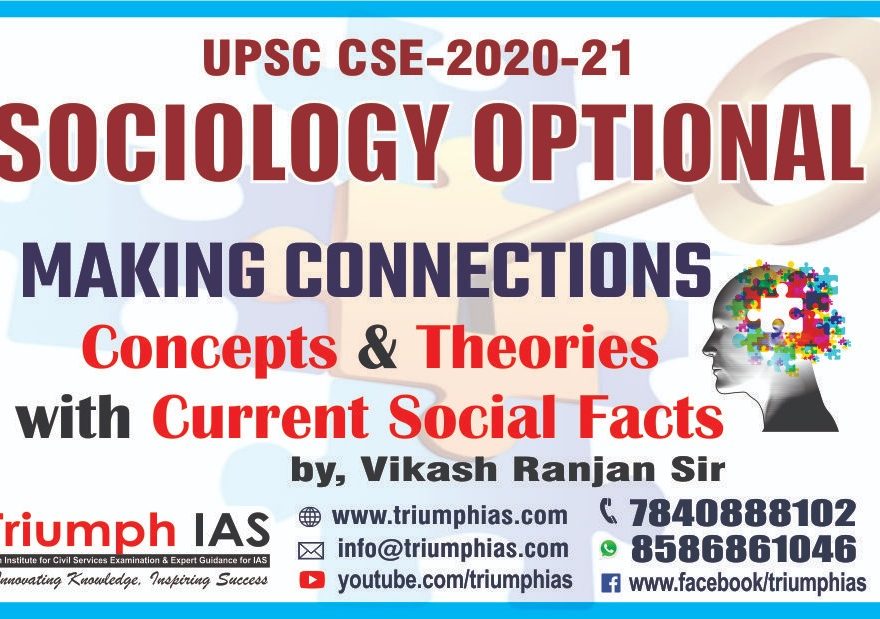Sociology of Corona Virus Outbreak: Themes & Perspectives by Vikash Ranjan
Relevance: Sociology & G.S paper I: society
Risk society is part of our daily life. Outbreak of CoV reminds us how current societies are vulnerable both biologically and mentally. We have to improve the resilience not on the biologic basis but also at mental, social and spiritual level.
Coronaviruses (CoV) are a large family of viruses that cause illness ranging from the common cold to more severe diseases such as Middle East respiratory syndrome (MERS-CoV) and severe acute respiratory syndrome (SARS-CoV)
(1) An epidemic of coronavirus disease 2019 (COVID-19) has spread rapidly since December 8, 2019 in China
(2) The sudden outbreak of Corona from China to more than 30 countries has shocked the international community, and especially health policy makers around the world.
For example in Iran in February 25, 2020, the Ministry of Health and Medical Education (MOHME) reported 95 confirmed cases of COVID-19 and 15 fatalities. Many social and economic issues are tied to the Corona outbreak.
The Coronavirus shock was wider and stronger than severe acute respiratory syndrome (SARS), bird flu, and swine flu in previous years. This particular outbreak of Coronavirus revealed how a biological and epidemiological issue can be transformed to a social, economic and political subject.
The most common and the most important strategy of states facing this virus has been public health approach. Enhancing the capacity of clinics and hospitals and strict quarantine of infected patients, campaigns for hand washing and cough etiquettes were commonly used.
However, the demands have gone much farther. Despite lack of evidence for use of masks by general population, an enormous demand for buying masks occurred worldwide. Many daily activities even in cities without confirmed cases were affected.
Quarantines of large cities and some sort of home confinement for even unaffected persons occurred. In a rare event some countries closed their borders and restricted their flights.
One of the most important consequences of the Coronavirus outbreak is the creation of social anxiety worldwide. This has led to serious concerns for citizens in all countries, even in societies without a confirmed outbreak. The sense of disappointment especially among the younger generation, heralds how our societies are vulnerable in facing hazards.
How Risk society is part of our daily life?
The German sociologist Ulrich Beck defines it as a systematic way of dealing with hazards and insecurities induced and introduced by modernization itself
(3) He attributes this to a far-reaching change which he calls “reflexive modernization”, where unintended and unforeseen side-effects of modern life backfire on modernity, questioning the very basis of its definition.
(4) Coronavirus outbreak shows that risk society leads to a vulnerable society. Although pregnant women, families with children, older adults, disabled and low-income individuals suffer disproportionate harm in epidemics and disasters.
(5) in the case of Corona epidemics, all groups in communities felt that they are at risk. That is why in risk society, huge investments should be made to study risk perception and communication, largely with the aim of “managing” conflicting opinions as to the magnitude of hazards and quelling society’s paranoia about issues of public health and personal security
(6).The outbreak of coronavirus and its associated health and social consequences should be considered as one of the most important social events in human life in the 21st century.
What made this outbreak different is the worldwide sense of fragility of human biological life and their demand for “sterile society”, safe from any hazards. The dream of “sterile society” is basically founded in human demand for eternity.
Existing policies are trying to expel the virus out of society. The fear of exposure has resulted in irrational behaviour in general population. Furthermore, this has resulted in ridiculous non-scientific policies by policy makers in some countries.
The resilience has reached its lowest levels in many countries and people are doing anything to escape from the virus. This demand had its own effects on policy makers and forced them to do something even though they are informed it would not help and it is not cost effective.
The World Health Organization referred to the novelty of the new strain of the virus. Novel coronavirus (nCoV) is a new strain that has not been previously identified.
The important question is what is the novelty of the human body in reaction to this new virus? Apparently, virus chains are renewing on daily basis while we are trying to prevent exposure by social action.
There are important questions. Are we able to update a sterile society, and how long does this sterility last?
How could we prevent the occurrence of these new mutations in viruses?
(7) Most of health crisis are directly linked to human behaviour in the environment
(8) Our destructive wreckful behaviour in the Earth, has damaged the environment enormously in the past century. We should start a new biological and social dialogue with the environment including the world of viruses.
Even in this current Corona epidemic there are suggestions that food and housing behaviour had an important role in promoting of mutation in viruses. A new interdisciplinary approach with cooperation of sociologists, philosophers, anthropologists as well as virologists, epidemiologists, and public health experts to have a change both in our behaviour to environment and in our actions in facing a crisis is required.
For more such notes, Articles, News & Views Join our Telegram Channel.
Click the link below to see the details about the UPSC –Civils courses offered by Triumph IAS. https://triumphias.com/pages-all-courses.php

